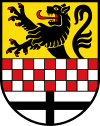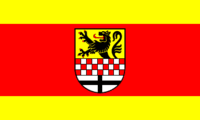Märkischer Kreis
| Märkischer Kreis | |
|---|---|
| District | |
 | |
| Country |
|
| State | North Rhine-Westphalia |
| Adm. region | Arnsberg |
| Capital | Lüdenscheid |
| Area | |
| • Total | 1,058.95 km2 (408.86 sq mi) |
| Population (31 December 2013)[1] | |
| • Total | 416,240 |
| • Density | 390/km2 (1,000/sq mi) |
| Time zone | CET (UTC+1) |
| • Summer (DST) | CEST (UTC+2) |
| Vehicle registration | MK |
| Website | http://www.maerkischer-kreis.de |
The Märkischer Kreis is a district (Kreis) in central North Rhine-Westphalia, Germany. Neighbouring districts are Unna, Soest, Hochsauerland, Olpe, Oberbergischer Kreis, Ennepe-Ruhr, and the city of Hagen.
History
The district was created in 1975 as part of the reorganization of North Rhine-Westphalian districts. The former districts of Lüdenscheid and Iserlohn, together with the City of Iserlohn, previously an urban district, plus the area around Balve (previously part of Arnsberg District) were amalgamated to form the new district. Lüdenscheid District itself had been created just a few years earlier, in 1968, when the city of Lüdenscheid was merged with Altena District (originally created in 1753). The name Märkischer Kreis was chosen in recognition of the fact that part of the territory formerly belonged to the county of the Mark.
Twinning
Twinning with Wrexham County Borough (Wales, United Kingdom) dates from 1970 and was initiated by the precursor district, Iserlohn.
In 1992 a twinning agreement was reached with the Finsterwalde District of Brandenburg, unofficial relations between the two districts having existed since German reunification in 1990. Following Finsterwald's merger with the district of Elbe-Elster, twinning with the new district was reconfirmed in 1996.
In 2001 a twinning agreement was officially established with the Polish district of Racibórz.
Geography
Geographically speaking, the Märkischer Kreis covers the northwestern part of the Sauerland mountains, south of the Ruhr valley. The highest point, at 683 metres above sea level, is the Nordhelle. The district's principal river is the Lenne, another river is the Hönne. Although most of the district is covered by forest and is rather sparsely inhabited, the area has had a long industrial history: it was, in fact, the very abundance of timber in the area which made steel-working possible here long before Ruhr coal became readily available.
Coat of arms
 |
The lion and fess chequy are taken from the old coat of arms of the district of Altena, which derived from the arms of the Counts of the Mark. In the first half of the 13th century a seal with both the fess and the lion was in use, as first used by Adolf I of Altena (1199–1241). Engelbert I of the Mark (1249–1277) dropped the lion in his seal. The original colour of the lion was unknown, so a black lion with red tongue and claws was chosen, as in the arms of the Dukes of Jülich. The black cross comes from the arms of Cologne, as the eastern part of the area historically belonged to the Archbishops of Cologne.
The coat of arms was designed by the herald Waldemar Mallek, and was granted on May 6, 1976. |
 |
Towns and municipalities
| Cities (population) | Municipalities (population) | |
|---|---|---|
|
|
Politics and administration
The district is led by a Landrat. Originally the Landrat was only a representative post, while the Oberkreisdirektor was the head of the administration; however, since 1999 the two posts have been unified. The headquarters of the administration of the county are located in Lüdenscheid, but there are county halls with parts of the administration in Iserlohn and Altena, too. The police headquarters of the county are in Iserlohn.
| Landrat | Oberkreisdirektor |
|---|---|
|
|
The county council meets in the county hall in Iserlohn. Its last election was on September 26, 2004.
| Party | Votes | Seats |
|---|---|---|
| CDU | 44.4% | 32 |
| SPD | 30.0% | 22 |
| Greens | 7.7% | 6 |
| FDP | 7.4% | 5 |
| Independent (UWG) | 6.7% | 5 |
| NPD | 1.9% | 1 |
| Republican | 1.8% | 1 |
Culture
From 1970 to 2005 the Märkischer Kreis hosted an international Jazzfestival. Since 2002 the cave in Balve is the home of the Irish Folk & Celtic Music festival. Since 1991 the Balver Maerchenwochen are organized by the Festspiele Balver Höhle.
The Luisenhütte is an industrial monument in Balve.
References
- ↑ "Amtliche Bevölkerungszahlen". Landesbetrieb Information und Technik NRW (in German). 4 September 2014.
External links
![]() Media related to Märkischer Kreis at Wikimedia Commons
Media related to Märkischer Kreis at Wikimedia Commons
- Official website (German)
- Website for Märkischer Kreis tourism (German)
